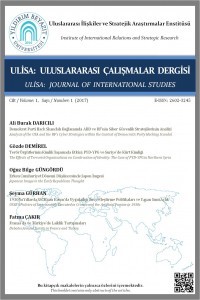
Ulisa: Uluslararası Çalışmalar Dergisi
Yazarlar: Şeyma GÜRHAN
Konular:Siyasi Bilimler
Anahtar Kelimeler:Crimea,Crimean Turks,Soviet Russia,Stalin
Özet: USSR, which is one of the most important states in world history, aimed to create a spreading area for itself with policies that can be ranked as various language and educational policies, economic policies, forced migration and exile to assimilate nations that are not Russian. In this direction, the Soviet Union created homo-Sovyeticus from the 1920s onwards, aiming to unite different peoples in Russia and to remove Russian nationalism. After dominating the Crimea, the main purpose of the Russian Empire was to make this region Slavic and also make it indivisible part of homeland. USSR applied the same policies here as well. In 1930s, when these policies were implemented have brought a tragic period to the fate of the former USSR people by leaving a big wound that stil seeps blood today. Especially in the field of economics, the people were abondoned to death by creating an artificial hunger. From this point of view, this study focuses on the applications of Russia towards the Crimean Turks and artificial hunger in Crimea during the period of 1931-1933, the execution of thousands of Crimean Tatar intellectuals or their exile, and the resistance of the Tatars against these collectivization movements.